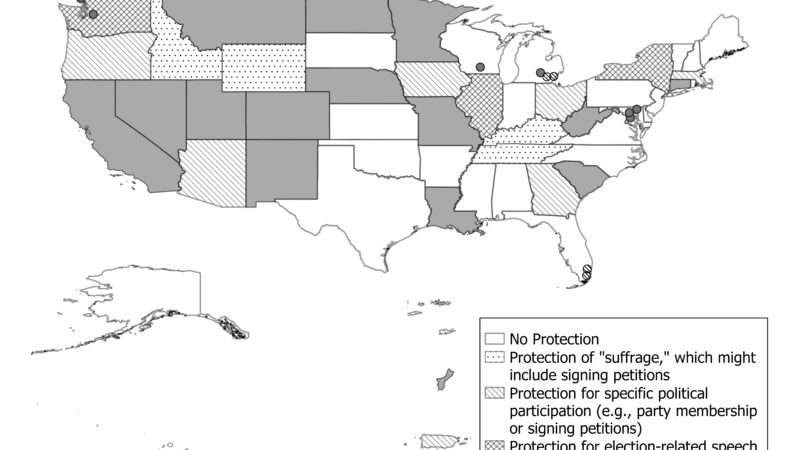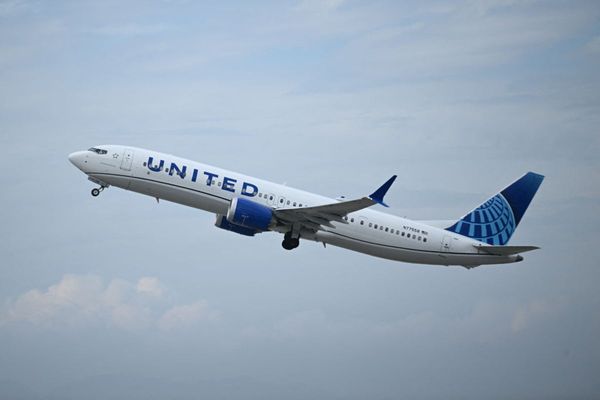
As I mentioned yesterday, ten years ago I wrote a descriptive and analytical law review article called Private Employees' Speech and Political Activity: Statutory Protection Against Employer Retaliation, which aimed to catalog these often-little-known statutes. This year, I'm returning to the subject, trying to analyze the strongest arguments for and against such statutes. The article (Should the Law Limit Private-Employer-Imposed Speech Restrictions?) will be published later this year in a Journal of Free Speech Law symposium issue, together with other articles that stemmed from an Arizona State symposium on Non-Governmental Restrictions on Free Speech; and this week and next I'd like to serialize it here.
Yesterday, I blogged the Introduction and the beginning of the argument in favor of such statutes, focused on the democratic self-government theory of the First Amendment; today, I add a discussion of the search for truth, self-expression, and autonomy theories, plus a bit on negative theories. Future posts will also of course cover the arguments against such statutes (and you can see the arguments right now, if you'd like, by looking at the PDF of the article).
[* * *]
A. Search for Truth
The same argument in favor of the statutes as the one given with regard to democratic self-government largely applies to free speech as a tool for searching for truth, or for promoting the marketplace of ideas.[1]
The analysis is not quite identical: For instance, while we may resist the use of coercive economic power as a means of influencing democratic processes, we might not have the same reaction to it as a tool for influencing debates about other matters. But in practice, most facts and ideas that fall within the rubric of "the marketplace of ideas"—or for which we want there to be a "search for truth"—are closely connected to political debates, whether the facts and ideas relate to morality, religion, science, history, or even art, music, and literature. And, again, so long as we think governmental restrictions on speech undermine, simply by their practical deterrent effect, the search for truth and the marketplace of ideas, we should recognize that private employer restrictions can undermine those values as much.[2]
B. Self-Expression and Autonomy
The same applies to free speech as self-expression[3] and as a tool for growth as autonomous citizens:[4] The threat of losing one's livelihood can certainly sharply interfere with these values as well.
The bans on religious discrimination in employment offer a helpful analogy, I think. Those laws promote people's ability to exercise their religions without the fear of economic disaster if those religions prove unpopular. Likewise, bans on employer retaliation based on employee speech do the same for people's ability to express themselves politically or philosophically rather than religiously.
Indeed, Title VII's "religious accommodation" requirement already protects religiously motivated speech, as part of its protection for religiously motivated practice. An employer may not dismiss an employee for religiously motivated speech, even if the speech violates a generally applicable work rule, unless it can show that tolerating the speech would cause an "undue hardship," meaning a "more than de minimis cost."[5] Thus, for instance, courts have concluded that employers might have to allow employees to sign their e-mails with "In Christ,"[6] or to say "God bless you" and "Praise the Lord" at work;[7] might not be allowed to force employees to wear rainbow insignia that they and others perceive as supporting gay rights;[8] and might not be allowed to force employees to certify that they "value the differences among all of us."[9]
The same would even more clearly apply if, for instance, the employer fired an employee for engaging in a religious protest outside an abortion clinic or military recruitment office, under some sort of "no controversial off-duty speech" policy. To be sure, having to tolerate some speech, especially on-the-job speech, may indeed be seen as "undue hardship."[10] But Title VII does provide at least some protection for religious speech, though not unlimited protection.
Protection for employees' speech generally would simply extend this protection to nonreligious speech as well (though many of the existing employee speech protection statutes would set a higher bar for the employer than just having to show "undue hardship"). It would avoid what would otherwise be potentially unequal treatment for religiously motivated speech and comparable non-religiously-motivated speech: Why shouldn't someone who engages in a nonreligious protest outside an abortion clinic or military recruitment office be as protected as someone who engages in a religious protest?[11] And to the extent that Title VII has already been read as applying to "moral or ethical beliefs as to what is right and wrong which are sincerely held with the strength of traditional religious views,"[12] protecting speech more broadly would avoid having to evaluate the strength of the moral or ethical beliefs motivating the speech.[13]
C. Negative Theories
The strongest basis for sharply distinguishing private employers' speech restrictions from governmental speech restrictions—as a policy matter, and not just as a matter of interpreting the First and Fourteenth Amendments—likely lies in "negative theories" of the First Amendment. Under these theories, "justifications for the freedom of speech focus not on any special value of free speech, but on the special dangers presented by government regulation of that right."[14] If this is so, then one might be untroubled by nongovernmental regulations.
Yet even then one might argue that employer restrictions also present "special dangers," such as domination of debate by an ideological orthodoxy (conservative, liberal, or otherwise) that has captured much of the employer class, even if not domination of debate by government officials. And even if we endorse negative theories in some measure, for instance highlighting the impropriety of the government choosing which viewpoints can be expressed, we might still also view speech as positively valuable as well. If so, private employer restrictions may also improperly undermine freedom of speech, even if not as much as governmental restrictions do.
[1] See, e.g., William P. Marshall, In Defense of the Search for Truth as a First Amendment Justification, 30 Ga. L. Rev. 1 (1995); Eugene Volokh, In Defense of the Marketplace of Ideas / Search for Truth as a Theory of Free Speech Protection, 97 Va. L. Rev. 595 (2011).
[2] Naturally, one can imagine particular private employer restrictions—or governmental restrictions—that we might see as promoting the search for truth, because they deter speech that we think is false (e.g., misinformation about history or science or what have you) or even just that we think is misleading. But the Court's general view has been that, as a rule-utilitarian matter, the search for truth is more advanced by generally protecting most speech (with some exceptions, as for libel) rather than by allowing the government the discretion to decide which historical or scientific claims are false or misleading and should be banned: "The point is not that there is no such thing as truth or falsity in these areas [philosophy, religion, history, the social sciences, the arts, and other matters of public concern] or that the truth is always impossible to ascertain, but rather that it is perilous to permit the state to be the arbiter of truth." United States v. Alvarez, 567 U.S. 709, 751–52 (2012) (Alito, J., dissenting); see also id. at 731–32 (Breyer, J., concurring in the judgment) (generally endorsing Justice Alito's argument); see generally Eugene Volokh, When Are Lies Constitutionally Protected?, Knight Found. Paper Series (forthcoming 2022). The same argument can be made with regard to employers' being the arbiter of truth as to their employees' own speech (said on the employees' own behalf, and not on behalf of the employer).
[3] See, e.g., C. Edwin Baker, Scope of the First Amendment Freedom of Speech, 25 UCLA L. Rev. 964, 994 (1978).
[4] See, e.g., Seana Valentine Shiffrin, A Thinker-Based Approach to Freedom of Speech, 27 Const. Comment. 283 (2011).
[5] Trans World Airlines, Inc. v. Hardison, 432 U.S. 63, 84 (1977).
[6] Mail v. Foxhoven, 305 F. Supp. 3d 984, 993 (N.D. Iowa 2018).
[7] Banks v. Serv. Am. Corp., 952 F. Supp. 703 (D. Kan. 1996).
[8] EEOC v. Kroger Ltd. P'ship I, No. 4:20-CV-1099-LPR, 2022 WL 2276835 (E.D. Ark. June 23, 2022).
[9] Buonanno v. AT&T Broadband, LLC, 313 F. Supp. 2d 1069, 1082 (D. Colo. 2004).
[10] See, e.g., Berry v. Dep't of Soc. Servs., 447 F.3d 642, 655 (9th Cir. 2006) (undue hardship to force an employer to allow discussion of religion with clients or display religious items in cubicle where employee interviewed clients); Knight v. Connecticut Dep't of Pub. Health, 275 F.3d 156, 168 (2d Cir. 2001) (undue hardship to force employer to allow evangelizing with clients); Peterson v. Hewlett-Packard Co., 358 F.3d 599, 607-08 (9th Cir. 2004) (undue hardship to force an employer to allow anti-gay religious postings at work); Anderson v. U.S.F. Logistics (IMC), Inc., 274 F.3d 470, 477 (7th Cir. 2001) (undue hardship to force an employer to let an employee say "Have a Blessed Day" to "customers and vendors," though the court noted that the employer did allow the employee to use this phrase to others).
[11] Cf. Micah Schwartzman, What If Religion Is Not Special?, 79 U. Chi. L. Rev. 1351, 1419–21 (2012) (arguing for equal protection of conscientious belief, whether religious or not, though not focusing on employment).
[12] See 29 C.F.R. § 1605.1; Protos v. Volkswagen of Am., Inc., 797 F.2d 129, 137 n.4 (3d Cir. 1986); Nottelson v. Smith Steel Workers, 643 F.2d 445, 454 n.12 (7th Cir. 1981); Redmond v. GAF Corp., 574 F.2d 897, 901 n.12 (7th Cir. 1978); Ali v. Southeast Neighborhood House, 519 F. Supp. 489, 490 (D.D.C. 1981); Wondzell v. Alaska Wood Prods., Inc., 583 P.2d 860, 866 n.12 (Alaska 1978); Kolodziej v. Smith, 682 N.E.2d 604, 607 (Mass. 1997). But see Seshadri v. Kasraian, 130 F.3d 798, 800 (7th Cir. 1997) (Posner, J.) (concluding that Title VII doesn't apply when "the plaintiff's belief, however deep-seated, is not religious").
[13] For an argument that this broad reading of "religion" for Title VII purposes already protects a wide range of speech, see Vivek Ramaswamy, Save America's Workers from the Church of Wokeness, Newsweek, Mar. 4, 2021, https://perma.cc/Z3VZ-3RWZ.
[14] Keith Werhan, The Liberalization of Freedom of Speech on a Conservative Court, 80 Iowa L. Rev. 51, 87 (1994). See also, e.g., Frederick Schauer, The Role of the People in First Amendment Theory, 74 Calif. L. Rev. 761, 782 (1986).
The post Should the Law Limit Private-Employer-Imposed Speech Restrictions? Some Other Reasons Why appeared first on Reason.com.







